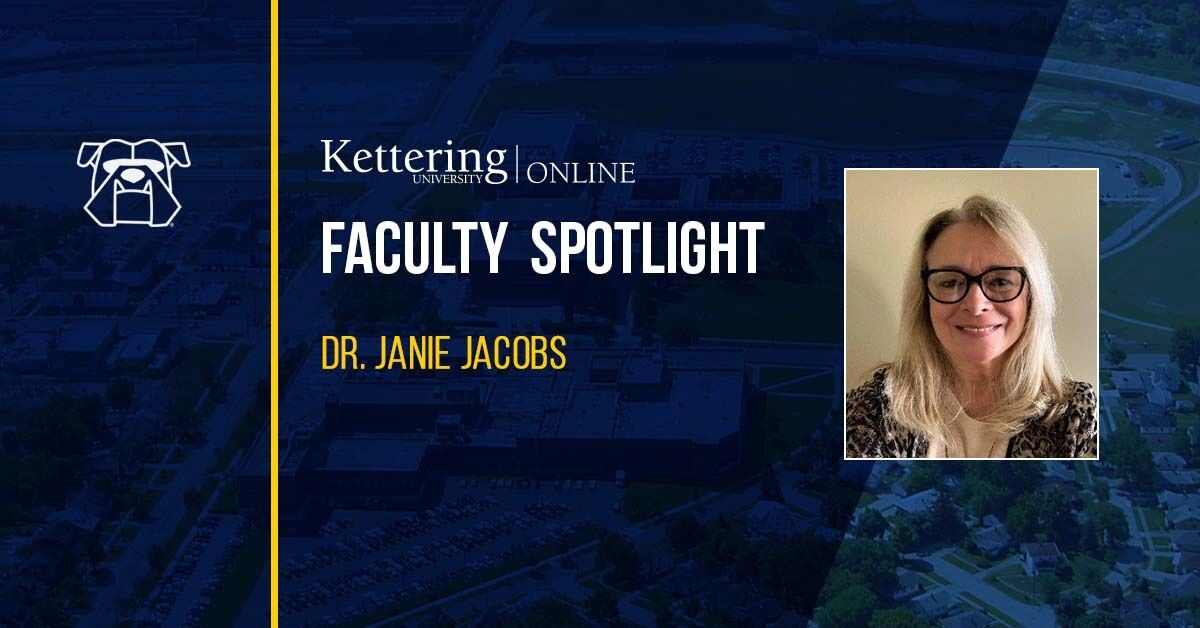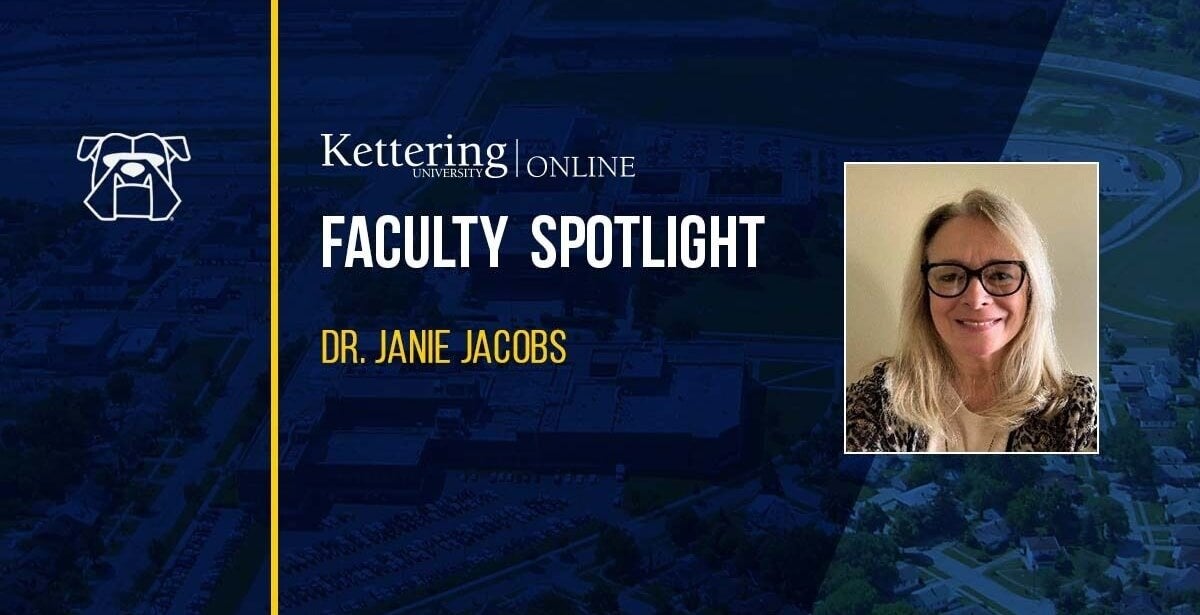
Faculty Spotlight: Dr. Janie Jacobs
As Kettering University Online’s (KUO) Program Development Manager and Senior Instructional Designer, I have the pleasure of working with our Contributing Faculty members and Faculty Mentors, many of whom are subject matter experts for the courses they teach. Coming from a wide range of educational, career, and geographical backgrounds, KUO faculty unite in an effort to link transformative experiential education to rigorous academic standards with real-world applications for learning that last a lifetime.
This time, we are happy to shine the Faculty Spotlight on Dr. Janie Jacobs. Dr. Jacobs teaches a course in leadership. Following are excerpts from our conversation:
JL: Dr. Jacobs, thank you for taking some time out of your busy schedule to chat! The first question I always ask is, where did you grow up?
JJ: I spent most of my childhood in northern Michigan. I enjoyed swimming in the summer on a beautiful lake southwest of Alpena and spent the winter months snowmobiling, skiing, and ice skating.
JL: Which degrees do you have and from where?
JJ: I have an Ed. D in Organizational Leadership with an emphasis in Higher Education from Grand Canyon University, an MBA in Human Resources Management from Baker College, and a B.S. in Public Administration from Central Michigan University.
JL: Currently, you teach the Leadership course. Can you talk a bit about the core components of good leadership?
JJ: There are several components that contribute to good leadership. I think strategic thinking and vision are important because a good leader has to have a clear and compelling vision for the future of a department or organization, and, with that, they have to be good communicators to be able to convey that vision. Also, leading with integrity and a core set of ethical principles are vital for the health of any team, as is the ability to empower others and foster a culture of trust by providing your team with autonomy and opportunities for professional and personal development. Lastly, I think emotional intelligence is essential. Good leaders know how to understand and manage their own emotions while recognizing and responding appropriately to the emotions of others. I think the people who can continue to work on honing these skills and abilities can become great leaders.
JL: I know from some of the work that I have done that there are several leadership styles. How do you encourage learners to explore their own unique leadership style?
JJ: First, I would say that it’s important to introduce learners to various leadership styles, such as transformational, servant, democratic, autocratic, and situational. Leadership is not a one-size-fits-all approach, and learners need to explore their own leadership style and develop the qualities that help them lead with confidence. So, at the beginning of the leadership course, I encourage them to take a self-assessment to help them begin to discover their own leadership style.
JL: Good leadership is intertwined with ethical decision-making. A quick Google search about leadership and ethics reveals tons of stories where leaders made unethical decisions. How do you incorporate ethical considerations into your course and help learners navigate the complexities of ethical leadership?
JJ: I like to incorporate case studies into the courses I teach to introduce learners to the kinds of ethical decision-making leaders have to make. Using real-life scenarios can help learners identify the consequences of different ethical choices, and it also encourages robust classroom discussions. I think it’s also important for learners to express their thoughts on the ethical leadership topics discussed in the course, so I encourage them to keep a journal so they can reflect upon and write about their values, the ethical challenges they have faced, and how they overcame these challenges through personal growth.
JL: Journaling is such a great idea. Switching gears, facilitating collaboration and teamwork are vital components of effective leadership. How do you encourage your learners to develop these skills, both inside and outside the classroom?
JJ: I encourage them by showing them how to embrace open discussions and debates with other learners so they can explore different perspectives about complex topics. When learners do this, they are actively honing their critical thinking skills, which is essential for both one’s personal life and career. I also encourage students to participate in group projects. People work in small groups and teams in almost every industry, so it is important for learners to understand how to work together to achieve common goals. Group projects are a great way for learners to practice effective communication and take responsibility for project outcomes.
JL: What are your favorite aspects of the course, and what impact do you hope it is having on learners?
JJ: My favorite aspects of the leadership course are the weekly discussions and the learning resources. I hope the concepts and ideas of the course resonate with learners as they work to explore their own leadership experiences.
JL: What would you love learners to come away with after they have taken this course?
JJ: I think the idea that leadership is a continuous, life-long journey of growth and development. Developing oneself into a good leader certainly doesn’t happen overnight, and leaders need to continually strive to improve and refine their skills.
JL: Speaking of teaching, what is your teaching philosophy?
JJ: I think it’s important to provide a supportive learning environment so students can feel excited about learning. This way, they will hopefully stay motivated while they are actively applying what they learn in the classroom to their lives and careers.
JL: What would you say about your Kettering learners?
JJ: Kettering learners are professionals in their respective fields. They are aspiring to become exceptional leaders, and it’s really evident through their dedication to their studies and how professional they are in their workplaces.
JL: What is the best advice a professor or mentor ever gave you?
JJ: A colleague once said to me, “Nothing happens by accident; everything is intentional.” Being a great leader also means you are intentional about things – especially the everyday decisions you have to make in order to provide your employees with the tools they need to be successful.
JL: Are there any particular career achievements or highlights you would like to mention?
JJ: Thanks for asking that. I have been fortunate to have received several recognitions. The most notable one was the Woman of Achievement award from the state of Michigan for my work in community leadership.
JL: My last question is always, what do you enjoy doing in your spare time?
JJ: I enjoy doing home improvement projects and spending time with family.
JL: Dr. Jacobs, thank you for creating space in your busy schedule to chat with us.
JJ: My pleasure!
KUO honors and appreciates Dr. Jacobs for her contributions and highly regarded work with students.
Learn more about the Global Leadership Certificate program, which can be a standalone professional certificate or part of an MBA or other online Master’s degree program.

